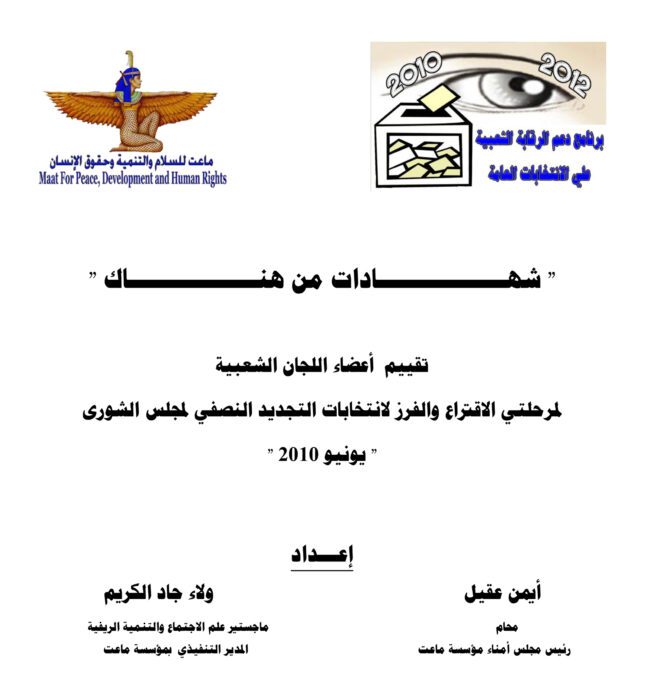” Testimonies from there
The midterm elections for the Shura Council in the eyes of members of the popular committees
The main challenge facing election oversight activities now is a systemic challenge in the first place. Seeking to build scientific and quantitative indicators to judge the integrity of the electoral process has become a major requirement for the development and expansion of civil society organizations’ oversight of elections, and a necessary condition for accurately identifying shortcomings and success in the electoral process. Based on numbers and ratios that do not lie or embellish, and these scientific and quantitative indicators are considered an important means of resisting the government's disregard for reports of civil society organizations in this regard and the constant questioning of the credibility of these reports.
In this context, and within the framework of the activities of the Program to Support Popular Oversight of the General Elections, Maat Foundation for Peace, Development and Human Rights issued its fourth report on the results of monitoring the 2010 Shura Council elections, which came under the title “Testimonies from There - Evaluation of members of the popular committees of the polling and counting phases of the midterm elections.” for the Shura Council.
The report is a scientific study based on a comprehensive social survey approach for members of the popular committees that were formed to monitor the Shura Council mid-term elections in June 2010 in ten constituencies out of a total of 88 constituencies in which elections were held, in order to try to identify their objective evaluation based on their realistic observations of each axe. And the steps of the polling and sorting phases.
The report revealed that the most important and common violations in the 2010 Shura Council mid-term elections, as decided by the members of the popular committees, were the failure to appoint a replacement from among the literate voters in the event of the temporary absence of one of the members of the sub-committee, and the failure of the heads of the general committees to announce the results in the manner that was required. Required by law, the presence of voters in the election assembly who did not cast their vote when the committee closed, the presence of policemen inside the polling stations without the request of the head of the sub-committee, the sorting of ballot boxes in the absence of the heads of the sub-committees supervising these boxes, the non-posting of voters’ instructions in the places prescribed by law, Non-compliance with the deadlines set by law for the closing and opening of committees, and the failure of the heads of sub-committees to keep damaged and unused cards.
The report indicated that the weak knowledge and capabilities of the members of the sub-committees is considered the first culprit in all the shortcomings, violations, abuses and violations of the provisions of the Law on the Exercise of Political Rights, and the general committees consisting of nine judges were also not spared from falling into the trap of committing abuses. The executive bodies were directly responsible for one of the most common and widespread violations, in addition to the responsibility of the candidates themselves for one of the most common violations that were monitored through the report.
The report recommended the need to reconsider the composition of the members of the sub-committees supervising the elections and to ensure that there is a legal element with full knowledge and knowledge of the legal rules regulating the electoral process at least at the head of each sub-committee. The report also put forward the idea of establishing an academy to supervise and manage the electoral process, to be During which continuous training programs are provided for all human cadres who will be relied upon to manage and supervise the electoral process
The report also called for not limiting participation in managing the electoral process to employees of the state's administrative apparatus, and seeking the assistance of other groups such as workers, volunteers, members of civil organizations, as well as self-employed people, provided they pass the training program. The report recommended expanding the scope of popular oversight over general elections, and working to institutionalize this oversight. And support and facilitate the task of observers access to the polls.
Maat Foundation for Peace, Development and Human Rights believes that this report is only a modest contribution to building an integrated methodological and scientific framework for evaluating the electoral process and judging its integrity, which requires the need to conduct other studies and research in this regard, as well as the necessity of holding specialized forums and forums in order to develop Scientific indicators for evaluating the electoral process, in order to reach the desired perfection in this matter.
shortlink: https://maatpeace.org/en/?p=37610












